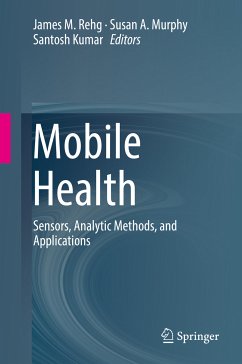
Mobile Health (mHealth) (eBook, PDF)
Rethinking Innovation Management to Harmonize AI and Social Design
Redaktion: Kodama, Kota; Sengoku, Shintaro
Versandkostenfrei!
Sofort per Download lieferbar
72,95 €
inkl. MwSt.
Weitere Ausgaben:

PAYBACK Punkte
36 °P sammeln!
This book examines the current status of mHealth development, regulations and the social background in Japan, South Korea and China, comparing it to the situation in the United States and the European Union and consider solutions to issues surrounding mHealth. The recent progress in mobile technology, represented by smartphones and smart watches, has been remarkable. A service called mobile health (mHealth), which uses such mobile technology to manage health, is also becoming a reality. Although the accuracy of medical devices is not as accurate as those used in medicine, the biometric informa...
This book examines the current status of mHealth development, regulations and the social background in Japan, South Korea and China, comparing it to the situation in the United States and the European Union and consider solutions to issues surrounding mHealth.
The recent progress in mobile technology, represented by smartphones and smart watches, has been remarkable. A service called mobile health (mHealth), which uses such mobile technology to manage health, is also becoming a reality. Although the accuracy of medical devices is not as accurate as those used in medicine, the biometric information such as heart rate and SpO2 can already be monitored over a long period of time. Although the technology is maturing to the point where it can be implemented in society, it remains an unapproved service of medical care in most countries. The development and social implementation of mHealth is most active in the US, but social implementation is gradually progressing in other countries as well. In this book, we will first discuss what kind of global and harmonized regulations are desirable by comparing the regulatory reforms necessary for social implementation of mHealth. In addition, mHealth raises privacy concerns in the US because the usual behavior and biometric information of subjects is utilized by private companies. In addition, it is important to note that the behavior and biometric information of subjects collected by smart devices is automatically analyzed by AI technology, mainly machine learning, which makes the analysis a black box.
Dieser Download kann aus rechtlichen Gründen nur mit Rechnungsadresse in A, B, BG, CY, CZ, D, DK, EW, E, FIN, F, GR, HR, H, IRL, I, LT, L, LR, M, NL, PL, P, R, S, SLO, SK ausgeliefert werden.












